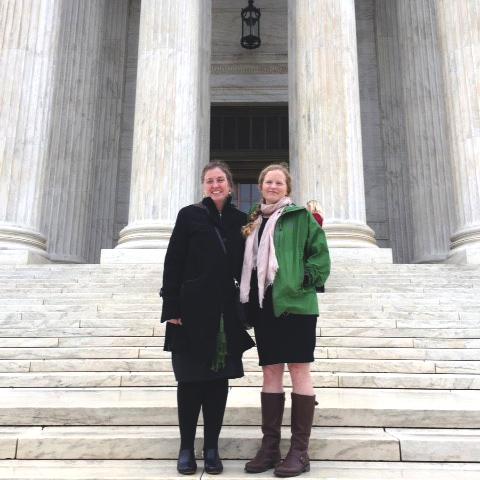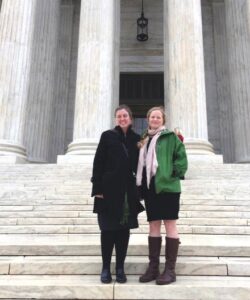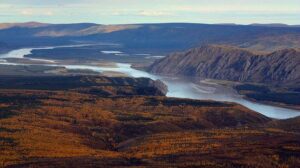
Supreme Court hears hovercraft case

Trustees’ legal director Valerie Brown and senior attorney Kate Strong at the Supreme Court.
Today the U.S. Supreme Court heard oral arguments in a case that has broader implications than John Sturgeon’s desire to use a hovercraft to hunt moose in Yukon-Charley Rivers National Preserve.
Depending on what the Court decides, the case could erode rural subsistence rights in Alaska, remove National Park Service authority over waterways in National Park Units, and alter the landscape of environmental law on public lands.
“Centuries of water law support federal authority over navigable waters and other public lands,” said Katie Strong, a senior staff attorney with Trustees for Alaska. “It’s unclear from the court’s questions today what will happen but we hope that the decision will uphold the Park Service’s authority to protect conservation and subsistence.”
Questions of authority
Sturgeon filed the lawsuit in 2011 with the support of the State of Alaska, claiming that the State, not the National Park Service, has the authority to regulate navigable waters inside national parks and preserves.
Trustees filed an amicus brief in support of NPS in the case, Sturgeon vs. Frost, and has worked on the case ever since.
Two Trustees attorneys were in the courtroom today to hear arguments. They said the justices posed questions all over the map, ranging from issues of federalism to those of subsistence rights in Alaska. Only Justice Thomas and Justice Ginsburg were silent.
Subsistence rights in question
The full transcript of the arguments reveals a range of questions with broad ramifications.

Yukon-Charlie National Preserve. NPS photo by Ken Hill.
At the start, Justice Sotomayor queried attorneys from Sturgeon and the State on how their arguments reconcile with the fact that NPS has a statutory duty to manage parks and preserves. In other words, how can NPS do its job if it has no say on what happens on rivers and waterways in the parks and preserves it oversees?
As the arguments continued, questions over federal subsistence fishing rights in Alaska tested the Katie John decision. Sturgeon has told reporters that he never intended to turn the case into one that undermines subsistence. However, sportsmen and hunting groups, including the Alaska Outdoor Council, of which Sturgeon is vice president, do oppose a rural subsistence priority.
How the Supreme Court rules could alter protections for public lands and food access rights in the years to come.
A decision should come within the next few months.


